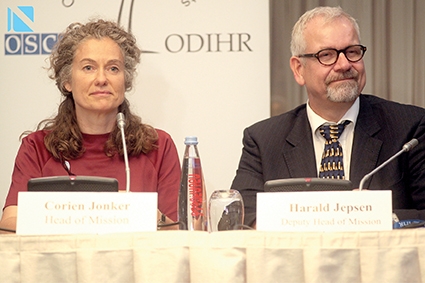Head of OSCE / ODIHR on the Local Elections
Exclusive Interview
How do Western observers assess the 21 October local elections in Georgia and what’s their take on some of the murkier events that took place on Polling Day? GEORGIA TODAY and Panorama TV Show sat down with head of OSCE / ODIHR observer mission, Corien Jonker, to discuss this and other things.
ELECTIONS AND NOTED...RECOMMENDATIONS HAD NOT BEEN ADDRESSED BY THE GEORGIAN AUTHORITIES.
I’d prefer to start with an overview of what we saw during the pre-election period and during election day. The mission is here for 6 weeks. What we observed is that fundamental freedoms were generally respected, that the contestants were able to campaign freely but also that the ruling party was dominantly visible and it affected the campaign and elections in different ways. When you are a dominant party, you should take responsibility and not limit other contestants in their opportunities. The election administration did an efficient job, but at the same time there was pressure put on voters and contestants. So, I have to report generally positive things but still improvements need to be made.
There is an ongoing investigation into reports that voter’s personal information was used to put pressure on absentee voters. How do you think this affected the outcome?
Political parties had more than one representative at the polling stations. They are allowed to have one observer per party for transparency as it is a very important element of democratic elections. But if you have more than one rep for a party then it’s a violation of the law. We also saw that representatives were there under the name of a civil organization or under the name of media but when we asked, they were representing one or other political party. Sometimes they interfered in the process.
There have been allegations that Muslim citizens of Georgia were made to SWEAR ON THE QURAN prior to the elections.
It was very difficult to really understand whether it happened or not and, if it did, under what circumstances.
To make people give religious oaths that they vote for a certain party should not be allowed. I can’t imagine who would do it, what kind of power that person would have over the voters. Really, it’s unacceptable and should not happen.
What about the Tianeti case [See page 8]?
It is too early to say what our observations are about Tianeti. It’s for our long-term observers, our colleagues in the field, to further assess and interview those involved to get a full understanding.
Will it be reflected in your final report?
Yes. We committed ourselves to stay until the second round so we will look into all complaints and appeals as well as preparations for the 2nd round. And then the preliminary statement the day after the second round. The OSCE/ODIHR final report is always published two months after the full completion of the election process.
No.2 for the Tbilisi mayoral race was independent candidate Aleko Elisashvili, outnumbering big opposition party candidates. In Saburtalo DISTRICT WAS A BRIT, A DUAL citizen of Georgia, who came in at No.3 in his district. Independent, tiny budget and zero experience in Georgian politics. Do you think voters are fed up with mainstream politicians and party politics?
It is very difficult for me to talk on behalf of voters. What I can say that this is actually the first time for local elections here, that independent candidates got a significant amount of the vote. I think that’s a positive process and positive progress. If it gives more diverse opportunity for voters, I can only support that. It gives vibrancy to the campaigns, gives different options to voters and of course it is up to voters to choose.
Vazha Tavberidze












